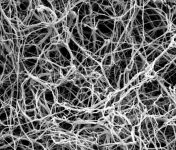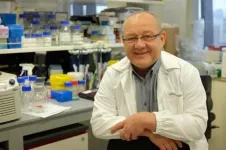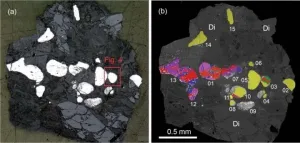Research identifies new ways to try and prevent lethal blood clots
2021-06-28
(Press-News.org) Scientists have made a breakthrough in understanding the process that leads to a blood clot forming in the lungs - a condition that kills more than two thousand people in the UK each year.
The clot forms a pulmonary embolism or blockage, cutting off blood flow to major blood vessels in the lungs.
In many cases, the blockage is caused by fragments that have broken away from a blood clot elsewhere in the body, such as a deep vein thrombosis in one of the legs. The fragments are transported to the lungs via the blood stream.
In a paper published today (28 June) in the scientific journal PNAS, researchers from the University of Leeds and University of Sheffield report on the role played by a protein called fibrin in stabilising the original clot to prevent bits of clot from breaking loose.
A blood clot forms if a blood vessel is ruptured, and its function is to stem blood loss. But sometimes, a clot can form inside a blood vessel in the absence of any injury, and this causes a thrombosis.
The research team used animal studies involving mice to investigate a key chemical building block of the clotting protein fibrin, known as γ-chain cross links (gamma chain cross links). The scientists found that the γ-chain cross links give the fibrin its stability through enhanced resistance to rupture and clot fragmentation.
In the study, they looked at clot behaviour in mice that were genetically modified so they could not produce the stabilising γ-chain cross links in the fibrin, and compared them with mice that could.
The results revealed that the clots without the γ-chain cross links were more unstable and more likely to fragment and produced more associated embolisms.
Dr Cédric Duval, the study's lead author and lecturer in the School of Medicine at Leeds, said: "What we believe is happening is that without the γ-chain cross links, the fibrin is not strong enough to hold the clot in place against the forces generated in the body from muscle movement and from blood flow."
Professor Robert Ariëns, also from the School of Medicine at Leeds, who supervised the research, said: "The findings reveal the importance of the γ-chain cross links. These are the structural supports in the fibrin that keep the clot in place.
"By identifying the structural dynamics of this mechanism, we have identified new targets for drugs that could be developed to stop fragments of a thrombosis breaking away to cause an embolism in the lungs.
"This is a disease that is a major cause of disability and death around the world."
The research findings are an acknowledgement of a long-held suspicion on the part of Professor Ariëns that the structure of fibrin plays a role in the fragmentation of clots - but until now, there was no scientific evidence.
He said: "I have always thought that the remarkable elasticity of fibrin, which has been described as like rubber or spider silk would be important to prevent clot fragmentation and thus thromboembolic disease.
"I was astounded to see the level of differences in pulmonary embolism that resulted from a genetic mutation that resulted in reduced elastic recovery of the fibres. So, when I saw the results, it definitely was a "wow moment" and I also had the "I told you so" feeling."
INFORMATION:
The research was funded by the British Heart Foundation.
The paper - Elimination of fibrin γ-chain cross-linking by FXIIIa increases pulmonary embolism arising from murine inferior vena cava thrombi - is published in PNAS and will be available on the following link: https://www.pnas.org/lookup/doi/10.1073/pnas.2103226118
[Attachments] See images for this press release:

ELSE PRESS RELEASES FROM THIS DATE:
2021-06-28
The billions of microbes living in your gut could play a key role in supporting the formation of new nerve cells in the adult brain, with the potential to possibly prevent memory loss in old age and help to repair and renew nerve cells after injury, an international research team spanning Singapore, UK, Australia, Canada, US, and Sweden has discovered.
The international investigating team led by Principal Investigator Professor Sven Pettersson, National Neuroscience Institute of Singapore, and Visiting Professor at Lee Kong Chian School of Medicine, Nanyang Technological University, Singapore (NTU Singapore), and Sunway University, Malaysia, found that gut microbes that metabolise tryptophan - an essential amino acid - secrete small molecules called ...
2021-06-28
Researchers from Tallinn University of Technology, Grete Raba, Signe Adamberg, and Kaarel Adamberg showed that an acidic environment enhances the production of butyric acid from apple pectin by faecal bacterial consortia - microbiota. Pectin is a dietary fibre abundant in apples, berries, fruits, and vegetables. Pectin is used in jellies and desserts. As human digestive enzymes are not able to degrade pectin, it is metabolized by the microbes of the large intestine. The main conclusions of the research, published in FEMS Microbiology Letters, was the importance of environmental acidity (pH) on the composition and metabolism of colon bacteria. The colonic pH is, however, strongly related to one's diet.
Fibre-rich diets that contain plenty of whole-grain ...
2021-06-28
A connective tissue protein known to support the framework of organs also encourages immune responses that fight bacterial infections, while restraining responses that can be deadly in the condition called sepsis, a new study finds.
Led by researchers from NYU Grossman School of Medicine, the work revolves around the extracellular matrix (ECM) of connective tissues, once thought of as an inert framework that shapes bodily compartments, but increasingly recognized as a signaling partner with nearby cells in normal function, and a contributor to disease when signals go awry. Among the key players in the ECM are fibroblasts, the cells that make tough structural matrix proteins ...
2021-06-28
WASHINGTON, June 28, 2021 -- Ancient Rome's emperors did some pretty bizarre stuff -- bursting into uncontrollable fits of laughter, appointing a horse as a priest, dressing in animal skins and attacking people ... the list goes on. Why were they acting that way? Well, it might have been lead poisoning. In this week's episode, we unwrap the possibility that lead caused the Roman Empire's collapse: https://youtu.be/4k7CvSiomlA.
INFORMATION:
Reactions is a video series produced by the American Chemical Society and PBS Digital Studios. Subscribe to Reactions at http://bit.ly/ACSReactions and follow us on Twitter @ACSReactions.
The American Chemical Society (ACS) is ...
2021-06-28
Allabogdanite was first reported in the early 2000s from the Onello - a small iron meteorite recovered from the gold placer at the Bolshoi Dolguchan River in Eastern Yakutia. Chemically, the mineral belongs to phosphides - the compounds containing phosphorus in a negative oxidation state. It was named in honour of the crystallographer Alla Bogdanova. Since that, allabogdanite was identified in several iron meteorites. The recent discovery at the Dead Sea is the first confirmation of the mineral on Earth. Allabogdanite was detected in the course of a systematic study of terrestrial phosphides from the Dead Sea region.
'Our research included the experiments on phase transitions of terrestrial allabogdanite at high pressure and high temperature at the DESY synchrotron ...
2021-06-28
India and Pakistan have fought four wars in the past few decades, but when India faced an oxygen shortage in its hospitals during its recent COVID-19 surge, Pakistan offered to help.
On Twitter, hashtags like #IndiaNeedsOxygen and #PakistanStandsWithIndia trended. Finding these positive tweets, however, was not as easy as simply browsing the supportive hashtags or looking at the most popular posts. Negative tweets often hijack the supportive hashtags for trolling or fighting with other users. And Twitter's algorithm isn't tuned to surface the most positive tweets during a crisis.
Ashique KhudaBukhsh of Carnegie Mellon University's Language Technologies ...
2021-06-28
San Francisco, CA, June 28, 2021 - A new study by Pendulum Therapeutics was presented at the American Diabetes Association's (ADA) 81st (Virtual) Scientific Sessions, the preeminent global conference for diabetes clinicians, researchers, and professionals where cutting-edge science and advances in diabetes research, prevention, and care are discussed. The findings shine a light on proprietary probiotic formulations that may be used to help patients with Type 2 Diabetes (T2D).
The research report entitled, "Changes in Circulating Metabolites, Including Butyrate, Points to Underlying Mechanism of a Probiotic Intervention That Improves Postprandial Hyperglycemia in Type 2 Diabetes," is believed to be the first of its kind. Its findings show Pendulum ...
2021-06-28
(Philadelphia, PA) - Like a blocked water line, obstructions in blood vessels in the human circulatory system can cause serious problems. This is especially the case in superior vena cava syndrome (SVCS), in which oxygen-depleted blood returning from the head, upper chest, and arms is partially or completely prevented from reaching the heart. The result, however, is far more serious than the inconvenience of low water pressure from a clogged pipe - SVCS requires immediate attention.
Each year, some 15,000 people in the United States are affected by SVCS, symptoms of which include facial swelling, ...
2021-06-28
A new paper published by an East Carolina University researcher in the Department of Coastal Studies shines light on the effect human-made infrastructure and natural topography has on coastal wetlands after major storm events.
In partnership with NASA and Florida International University, the study, led by assistant professor David Lagomasino, was published in the July edition of Nature Communications.
The study focused on the effects of Hurricane Irma, which struck Florida in 2017, and the damage it caused to the state's mangrove forests. The research team found that the forests suffered unparalleled dieback after the major hurricane.
Mangrove forests are often damaged after hurricanes, but Lagomasino said forests in Florida have shown great resiliency in ...
2021-06-28
LMU biologists have shown that 'supervisor' and 'motivator' proteins are required to enable a third factor to perform its function in photosynthesis.
Plants, algae and cyanobacteria need only three ingredients for the synthesis of sugars via the process of photosynthesis - carbon dioxide, water and sunlight. However, the operation is far more complicated than this simple list of ingredients might suggest. Prof. Dr. Dario Leister and research group in the Department of Biology I at LMU are analyzing the complex regulation of photosynthesis. Their latest findings shed light on the roles of three proteins, named PGRL1, PGRL2 and PGR5, which participate in the control of one of the two subsystems of the photosynthetic apparatus. PGRL2 itself was first discovered in the course of the ...
LAST 30 PRESS RELEASES:
[Press-News.org] Research identifies new ways to try and prevent lethal blood clots






